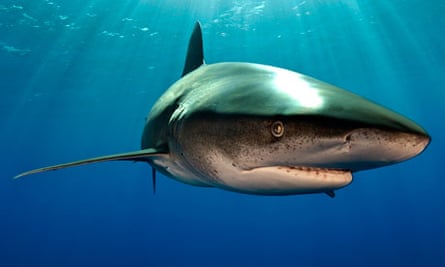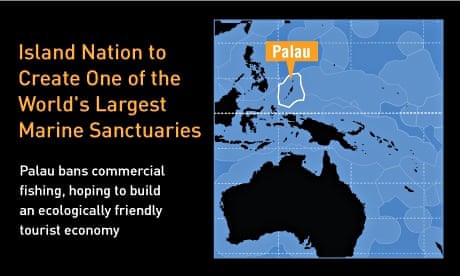The Pacific island-nation of Palau is close to kicking all commercial fishing vessels out of its tropical waters. The move will single-handedly section off more than 230,000 sq miles of ocean, an area slightly smaller than France, to create one of the world's largest marine reserves. The sanctuary, which Palauan President Thomas Remengesau Jr announced at the United Nations last month, would also sit inside the world's last healthy stand of lucrative, tasty tuna.
Giving fishing vessels the boot is bold for any nation, but perhaps more so for Palau, a smattering of 300 islands east of the Philippines. Tuna, America's favorite finned fish, is a regional boon worth an estimated $5.5bn. Commercial fishing, largely by boats from Japan and Taiwan, represents $5m annually – or 3.3% of GDP – to Palau. But still, the island state says it will allow existing fishing licenses to expire.
The move, hailed by ocean conservationists, sets a worrying precedent for the tuna industry. While the commercial catch inside Palau is minimal, captains covet the freedom to chase warm-blooded, migratory tuna across jurisdictions. If Palau goes through with the plan, it will mark the first time a nation has completely banned fishing vessels from its entire Exclusive Economic Zone.
"Our concern is not so much a practical one as it is a concern with the precedent of closing areas with no scientific basis for it," says Brian Hallman, executive director of the American Tunaboat Association.
"The migratory range of tunas is vast, covering the waters of many countries and the high seas. So the only way to conserve stocks is by international treaty arrangements and this is already being done."
Palau's decision to act alone could be seen as a warning to the fishing industry to take the sustainability concerns of smaller, fish-rich nations more seriously and to work with these countries on more nimble and responsive solutions.
A domino effect?
Palau currently works with seven of its island neighbors to co-operatively manage a large swath of ocean. Jointly, these eight nations set fishing quotas and sustainability standards to manage nearly a third of the world's tuna stock. Balancing both conservation and business, the alliance became the first group of countries certified by the Marine Stewardship Council for managing its tuna grounds sustainably.
But this arrangement hinges on allowing more-sustainable fishing inside member waters. If Palau bans commercial fishing, it's unclear how this will impact the broader regional effort.
"There's nothing in these agreements that require we allow fishing in our waters," Remengesau says in a telephone interview. "It's all about the regional area. Our conservation efforts would ensure that the stocks are healthy and that they gain in economic value as they move out of our territorial waters into other waters."
When it comes down to it though, banning commercial boats simply appears to be in Palau's interests.
Even though the bulk of commercial fishing in the region focuses on tuna, sharks are frequently hauled in as bycatch. Yanking sharks out of the sea directly hits Palau's biggest moneymaker: the $85m dive tourism industry.

"We feel that a live tuna or shark is worth a thousand times more than a dead fish," Remengesau says.
A visionary move?
A 2010 Australian study backs him up. The researchers calculated that shark divers bring Palau $18m per year, with each swimming shark worth $1.9m in diving and tourism. Through this lens, sharks contribute 8% of Palau's GDP.
Matt Rand, director of the global oceans legacy at Pew Charitable Trust, says taking full stock of the value of living marine resources makes both economic and conservation sense.
"I think it's visionary," he says. "[Remengesau] looked at the global picture for the oceans and decided to preserve the marine ecosystem, not only for the seas, but for his economy and for his people. I think there's tremendous conservation value in what Palau is trying to do."
But there's still a long way to go. While several studies show marine protected areas enhance fisheries and biodiversity, a study published in the scientific journal, Nature, last month shows that not all are created equal. Scientists examined 87 such areas and found that a marine preserve needs at least three of five criteria to be successful. The study found that many failed to do so, leaving 59% "not ecologically distinguishable from fished sites".
Palau's sanctuary would be large and legally protected – two key attributes for success – but its viability will likely hinge on the nation's ability to stop pirate fishing, which is no easy feat. Palau currently battles hundreds of pirate fishing vessels with a single patrol boat.
Pressure from the outside
Then there's the risk of international financial pressure.
Palau could stand to lose a lot more than the $5m in direct fishing revenue. The nation is slated to receive $215m from the US in economic assistance and grants through 2024. But Michael Tosatto, of the National Oceanic and Atmospheric Administration, says that if Palau bans American boats it may risk losing some of those funds.
"I wouldn't say everything is about tuna," he says, "but it's a large part. If it weren't for the tuna treaty, there likely wouldn't be a multilateral assistance agreement. I'm not with the State Department, so I can't say for sure, but if they fully extract themselves, they could lose access."
Will Palau remain committed to this plan even if it means losing US aid?
"We're very committed to it," Remengesau says. "But also, I don't believe the US would retaliate against a small island nation that is its best ally in the United Nations simply because they want to force something down our throats as far as our conservation efforts."
This story was produced by the Food and Environment Reporting Network, an independent non-profit news organization focusing on food, agriculture and environmental health







